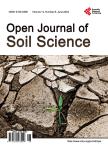Influence of Potassium Nutrition and Exogenous Organic Acids on Iron Uptake by Monocot and Dicot Plants
Influence of Potassium Nutrition and Exogenous Organic Acids on Iron Uptake by Monocot and Dicot Plants作者机构:Soil and Water Sciences Department Faculty of Agriculture Alexandria University Alexandria Egypt
出 版 物:《Open Journal of Soil Science》 (土壤科学期刊(英文))
年 卷 期:2020年第10卷第10期
页 面:486-500页
学科分类:07[理学] 0701[理学-数学] 070101[理学-基础数学]
主 题:Potassium Organic Acids Iron Uptake Biofortification Sustainability
摘 要:Iron (Fe) is a vital element for the survival and proliferation of all plants;therefore, Fe-biofortification by the application of chemical and organic fertilizers is being as an effective approach to fight hidden hunger retards the growth and development of crop plants. Two experiments were carried out to investigate the effect of potassium and exogenous organic acids on iron uptake by two different plants: one is monocotyledon, maize (Zea mays L.) and the second is dicotolydon pea (Pisum sativum L.) grown under controlled conditions. The seedlings were grown in sand culture in a greenhouse experiment and irrigated with one-tenth strength modified nutrient solution of Hoagland and Arnon as a base solution (pH 7.5), containing different iron treatments (0, 1, and 5 ppm as FeSO4·7H2O) combined with potassium nutrition (0, 5, 10, and 50 ppm as K2SO4). After 30 days, the best interaction treatment was selected for further experiment including 5.0 ppm Fe as FeSO4.7H2O and 50 ppm K as K2SO4 in combination with 1×10-5 mole/liter of one of the following organic acids: Citric acid, Oxalic acid, Formic acid, Acetic acid, Propionic acid, Tartaric acid, Succinic acid, Fumaric acid, Malic acid, Glutamic acid, besides the free organic acid nutrient solution as a control. Results revealed that the interaction between 5.0 ppm Fe and 50 ppm K was the best interaction treatment for increasing biomass production and iron



